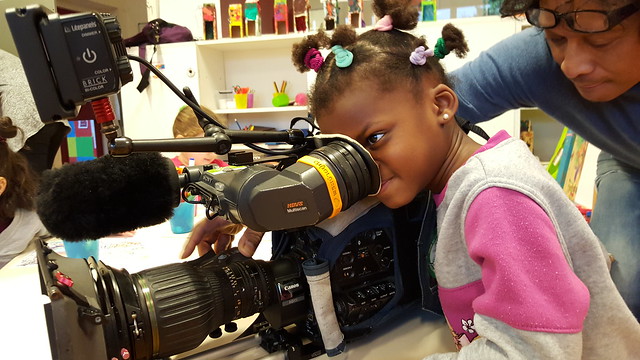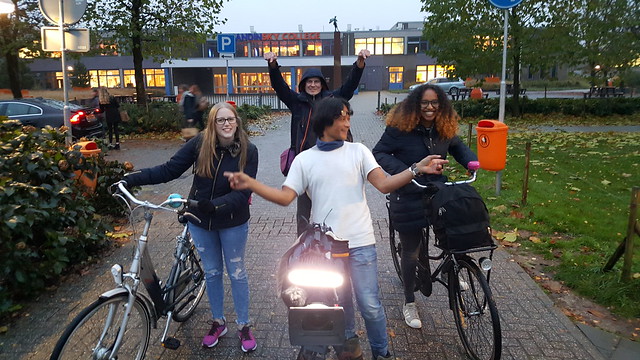One of the specifics of the Dutch system is that primary school education starts at the early age of four and lasts until the age of twelve. In the "Windmill School", first thing in the morning, the p
In this episode of Reporter the Dutch education system is under the spotlight.
 ADVERTISEMENT
ADVERTISEMENT
 ADVERTISEMENT
ADVERTISEMENT
“Windmills,” reported euronews correspondent Hans von der Brelie in the shadow of one of the Netherland’s iconic symbols. “We are here to discover the secret of the Dutch school system’s success.”
In Nijmegen an eastern Dutch city of around 200.000 inhabitants, euronews visited an ordinary primary school, called The Windmill. The pupils chose the name themselves.
It’s a mixed residential area, average and modest income people live side by side. We asked some parents why they send their children to this neighbourhood school.
“We got a tour by a pupil child about ten years old who was so proud to show his own school. So then I thought wow, the child here learns to present himself. So it is not only teaching the knowledge, but also they learn develop themselves here,” opined Irene Kwaaitaal.
 One of the specifics of the Dutch system is that primary school education starts at the early age of four.
One of the specifics of the Dutch system is that primary school education starts at the early age of four.
In the “Windmill School”, first thing in the morning, the pupils choose what they want to learn. Many opt for maths – it’s just fun. No surprise, because teaching methods are closely linked to real life. Today it’s about the mystery of the missing clothes-pegs as a way of understanding subtraction.
The school’s director explains the basics.
“Critical thinking is one of them, but for us the most important is working together. And working together means that you talk about responsibilities. I am responsible for this school, but the children are also responsible for letting us hear what they think is important,” stressed Roger Visser, Headmaster, Windmill Primary School.
Today’s school board meeting is discussing how to redesign the schoolyard. It is not a closed meeting of teachers, but as usual includes pupils from different age groups. The meeting is for real so are the decisions – where to put benches, how to delimit playgrounds.
“It is really nice and other kids want to be in this School Board Council too. Here we sit together to discuss all kind of things that need to happen in this school,” said student council member, Michelle who is eight-years-old.
“When I came to school it was a bit different. Now it is much nicer because right now different age groups are playing together. That is nice. The elderly kids can help the younger kids and take some responsibility,” added another member 11-year-old Baran Kiyak
That’s Nijmegen is nicknamed the “Dutch Havana” because of the left-leaning City Council.
The city introduced a computer-based system considered to be a weapon against school segregation. Renske Helmer is the councillor in charge of education.
“The problem was that in some schools there were too many socially or economically deprived children. Those were called ‘black schools’, – pupils were mostly migrants’ children. The problem was that advanced children were sent by their parents to other schools, “fleeing” the neighbourhood. So we had weak schools and strong schools. Our solution was to look at how to mix the population of these schools,” she pointed out.
Let’s move on to just an ordinary secondary school. The Nijmegen based Kandinsky College offers different options under one roof. There is an amazing diversity of school leaving certificates.
Ikraan Hayd is 17-years-old. She arrived in the Netherlands 10 years ago, from Somalia. It took her one year to pick up the basics of the Dutch language. But she knows a special effort is needed as is strong support by teachers.
“The teachers give extra help. I am bad at Dutch. I think I am bad at languages in general. Besides that every teacher here knows what I am bad at and what I am good at. So they try to improve those areas in which I am good even more – and to improve the areas where I am bad,” she said.
In Ikraan’s Dutch language lesson teacher Ton is among the teenagers – not in front of the class. He starts the lesson with some jokes and a creative speed writing contest in order to wake up the kids.
Observing closely what is going on in Ikraan’s language class the very essence of the Dutch success model becomes clear.
Ton the teacher has detailed knowledge about what’s going on in the head of each single child and hands out tailor-made questions, tailor-made support, tailor-made assignments.
“I think here it is cool. The method is the lack of hierarchy. There is not much distance between the students and the teachers, so there is an open-minded culture. Students are not insecure to ask questions,” opined Tone Willems.
Never stop teaching the teachers. That’s one of the fundamentals of the Dutch system. Today, Kandinsky College invited primary school teachers from the area to make them familiar with a technique called “positive behaviour support”.
It’s a method Kandinsky College imported from the USA and is about trying to always stress each child’s strong side.
Gretchen Conrad is from the States too. She worked and lived as an English teacher and parent in France and now in the Netherlands. The French system she calls “elitist”, built on sanctions, frustrations and exclusion of the weak ones.
“In France you are spoon-fed information, you recite things, they write lots of things on the board, you must re-write it perfectly, the handwriting is more important than what it actually means, whereas here we try to teach kids to think for themselves.
‘In Holland, we would never dare to say “ you are stupid”. We try, especially in this school, to be positive. We try to encourage the students and certainly not penalise them,” she said.
At the end of a long school day – and school days are long in the Netherlands Ikraan gave us her opinion on the best way to give each child a real chance.
“Do not give up with small children. Never! If you say to a child: you will never learn, or if you get constantly low marks even though you are making a real effort to learn, it will never work. If you give a lot attention and let the child learn and try, instead of creating obstacles then it will work,” she stressed.
Ikraan wants to top her medium-level certificate with a follow-up degree that will get her to university. She has a dream to one day become a doctor.











